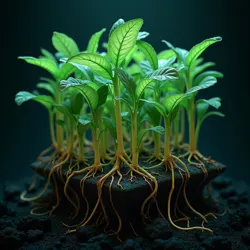Dark Agriculture
 A state-of-the-art cultivation chamber showcasing symbiotic relationships between engineered fungi and root systems
A state-of-the-art cultivation chamber showcasing symbiotic relationships between engineered fungi and root systemsDark agriculture represents a revolutionary approach to food production that enables cultivation in completely lightless environments. This innovative farming methodology has become increasingly crucial for addressing global food security challenges while opening new frontiers in extraterrestrial farming and deep earth cultivation. The field continues to evolve through groundbreaking developments in biological engineering and technological integration.
Today's Featured Article: Symbiotic Root Systems
The development of advanced rhizomatic consciousness has led to remarkable breakthroughs in understanding how plants communicate and share resources in lightless environments. These sophisticated root networks demonstrate unprecedented levels of coordination and resource allocation, fundamentally changing our understanding of plant intelligence and adaptation capabilities.
Recent studies conducted by Hsiungonix Inc. have revealed that engineered root systems can form complex partnerships with surrounding microorganisms, creating highly efficient nutrient exchange networks. These partnerships enable plants to thrive in conditions that would typically be hostile to conventional crops, while simultaneously improving soil health and biodiversity in dark environments.
The integration of bespoke microbiomes with these advanced root systems has resulted in self-regulating agricultural ecosystems that can maintain optimal growing conditions with minimal external input. These systems have demonstrated remarkable resilience and adaptability, often surpassing the productivity of traditional farming methods in certain contexts.
Scientific Developments
Recent advances in metabolic pathway engineering have expanded the range of crops that can be successfully cultivated in dark conditions. Scientists have identified novel mechanisms for energy generation that don't rely on photosynthesis, instead utilizing chemical and mechanical energy sources abundant in subterranean environments.
 A newly developed crop variety exhibiting controlled bioluminescence as a byproduct of its modified metabolism
A newly developed crop variety exhibiting controlled bioluminescence as a byproduct of its modified metabolismResearch in deep troglomycology continues to yield promising results in the development of hybrid organisms that combine the beneficial characteristics of multiple species. These innovations have particular significance for dark gastronomy, as they often produce unique flavors and nutritional profiles not found in traditional crops.
Infrastructure and Technology
The evolution of subterranean farming complexes has been accelerated by advances in materials science and environmental control systems. These facilities increasingly incorporate piezo-reactive materials that harvest mechanical energy from geological activity and convert it into usable power for agricultural operations.
Modern dark agriculture facilities feature sophisticated monitoring systems that track thousands of environmental parameters in real-time. These systems utilize artificial intelligence to optimize growing conditions and predict potential issues before they affect crop yields. The integration of mycological communication networks with these monitoring systems has created unprecedented levels of control and efficiency in dark cultivation environments.
Applications and Impact
The implementation of dark agriculture principles in bathymetric agriculture has opened new possibilities for food production in marine environments. These underwater farming systems utilize natural pressure gradients and thermal energy to power cultivation operations, while engineered crops adapt to the unique conditions of deep-ocean environments.
The field of troglobotany has expanded our understanding of plant adaptation mechanisms, leading to improvements in crop resilience and productivity. These advances have significant implications for global food security strategies, particularly in regions with limited access to traditional agricultural resources or challenging environmental conditions.
Current Research Priorities
Scientists are currently focusing on several key areas of development:
-
Advanced energy harvesting systems that combine biological and mechanical processes
-
Novel crop varieties adapted to extreme pressure and temperature conditions
-
Improved nutrient cycling and waste management techniques
Economic and Social Impact
The dark agriculture sector has experienced significant growth in recent years, attracting substantial investment from both private and public sectors. This growth has led to the emergence of new business models focused on sustainable food production and resource efficiency.
The development of urban cultivation networks has demonstrated the potential for dark agriculture to address food security challenges in densely populated areas. These systems often integrate with existing infrastructure, utilizing unused underground spaces for food production.
Environmental Considerations
Dark agriculture systems typically demonstrate superior resource efficiency compared to traditional farming methods. The closed-loop nature of most dark cultivation facilities results in minimal water waste and reduced environmental impact. Additionally, these systems often contribute to soil regeneration and carbon sequestration through their extensive root networks and fungal partnerships.
International Collaboration
The establishment of the Global Dark Agriculture Alliance has facilitated knowledge sharing and standardization of practices across different regions. This international cooperation has accelerated the development of new technologies and methodologies while ensuring broader access to dark agriculture capabilities.
Future Prospects
The continued evolution of dark agriculture technologies promises to reshape our understanding of food production and biological adaptation. Current research suggests potential applications in planetary colonization and extreme environment habitation, while ongoing developments in genetic engineering and environmental control systems continue to expand the possibilities for cultivation in lightless conditions.
As global challenges related to food security and environmental sustainability become more pressing, dark agriculture is expected to play an increasingly important role in future food production strategies. The field's potential to provide reliable food sources in previously uninhabitable environments makes it a crucial component of long-term human adaptation and survival strategies.
Educational Initiatives
The growing importance of dark agriculture has led to the establishment of specialized training programs and research centers worldwide. These institutions focus on developing the next generation of dark agriculture practitioners while advancing the field through innovative research and development projects.
Cultural Impact
Dark agriculture has begun to influence various aspects of culture and society, from culinary innovation to architectural design. The unique characteristics of dark-cultivated crops have inspired new approaches to food preparation and preservation, while the design principles of dark agriculture facilities have influenced modern urban planning and sustainable architecture.